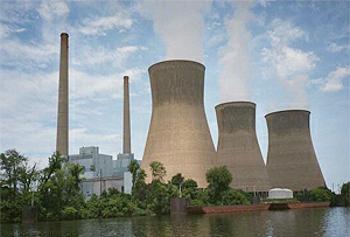Appeals Court: Power Companies Can Be Sued for Greenhouse Gas Emissions
NEW YORK, New York, September 23, 2009 (ENS) - In a historic ruling, the Second Circuit Court of Appeals has sided with states and private land trusts that sued large power companies to make them curb their greenhouse gas emissions.
A federal district court judge had dismissed their claims as being a political, not a judicial, issue.
But Monday, the Second Circuit Court of Appeals ruled that the power companies can be sued in federal court because their carbon dioxide emissions are a public nuisance that contributes to rising temperatures and other damaging impacts, such as heat waves, smog episodes, droughts and forest fires.
The appellate court held that federal courts are empowered to limit damaging carbon dioxide emissions unless and until the legislative and executive branches regulate that pollution, either under the existing Clean Air Act or the comprehensive new energy and climate legislation now working its way through Congress.
Judge Sonia Sotomayor, originally a member of the three-judge Court of Appeals panel on this case, was elevated to the Supreme Court on August 8, 2009. The two remaining members of the panel, who are in agreement, decided the matter.
Connecticut Attorney General Richard Blumenthal personally argued the case and Monday praised the decision reinstating Connecticut vs. AEP, a lawsuit filed by him and other state attorneys general seeking to compel the nation's biggest greenhouse gas polluters to reduce their emissions.
"This ruling restoring our legal action breathes new life into our fight against greenhouse gas polluters and changes the legal landscape to impose responsibility where it belongs," Blumenthal said.
"Our legal fight is against power companies that emit a huge share of our nation's CO2 contamination, but it will set a precedent for all who threaten our planet with such pernicious pollution," Blumenthal said. "This ruling vindicates our tenacious and tireless battle on behalf of a powerful coalition of states and environmental advocates - a battle that will now have its day in court."
 |
American Electric Power's coal-fired John E. Amos power plant in Winfield, West Virginia (Photo by Tim Smith courtesy USACE) |
The lawsuit targets American Electric Power, the Southern Company, the Tennessee Valley Authority, Xcel Energy Inc. and Cinergy Company. The five power companies own or operate 174 power plants in 20 states that emit some 650 million tons of CO2 each year.
That amounts to about a quarter of the American electric industry's global warming emissions, and about 10 percent of the nation's total CO2 pollution.
In 2004, two groups of plaintiffs, one consisting of eight states and New York City, and the other consisting of three land trusts, separately sued the same electric power corporations, seeking abatement of defendants' ongoing contributions to the public nuisance of global warming.
New York District Court Judge Loretta Preska held that plaintiffs' claims presented a political question that was not appropriate or proper for judicial consideration and dismissed their complaints.
But in the decision issued Monday, Appeals Court Judge Peter Hall wrote, "We hold that the district court erred in dismissing the complaints on political question grounds; that all of Plaintiffs have standing; that the federal common law of nuisance governs their claims; that Plaintiffs have stated claims under the federal common law of nuisance; that their claims are not displaced; and that TVA's alternate grounds for dismissal are without merit. We therefore vacate the judgment of the district court and remand for further proceedings."
As a result, the case will again be heard at the federal district court level.
"The court's decision makes clear that the harms of global warming are real and need to be addressed today," said Matt Pawa, lead attorney for the land trusts Open Space Institute and the Audubon Society of New Hampshire. "Power companies that release millions of tons of dangerous carbon pollution are not above the law."
David Doniger, senior attorney and policy director for NRDC's Climate Center, said, "The best way to fight global warming is for the Senate to pass comprehensive clean energy and climate legislation. However, the court's decision guarantees that if the Congress fails to do its job, or blocks EPA from doing its job, the biggest power companies will still be held accountable in the federal courts."
Blumenthal said, "Our battle is not against the EPA or the federal government, which we have won already, but rather against the polluters themselves under federal nuisance law."
"Our goal is not money damages, but a change in company practices to stem the pollution and safeguard our environment and economy," he said. "This lawsuit is comparable to our fight against Big Tobacco, without the money. In the end, this legal crusade can help save lives and our planet from global warming."
"The eventual effects of CO2 pollution will be severe and significant - increasing asthma and heat-related illnesses, eroding shorelines, floods and other natural disasters, loss of forests and other precious resources. We must act, wisely and quickly, to stem global warming - and safeguard both our environment and economy. Time is not on our side."
"If the defendants wish to do the right thing voluntarily, so much the better for them and our nation," Blumenthal urged.
None of the defendant corporations has issued a public statement on the appeals court decision.
"This case is a critical milestone, allowing global warming cases to be decided by the courts, just as they decide complex water pollution, air pollution, and toxic dumping cases," said California Attorney General Jerry Brown. "It's highly significant that the federal court has affirmed the right of states to challenge the greenhouse gas emissions generated by coal-fired power plants. The time has now come for Congress to enact long overdue climate protection legislation."
Copyright Environment News Service (ENS) 2009. All rights reserved.
To subscribe or visit go to: http://www.ens-newswire.com